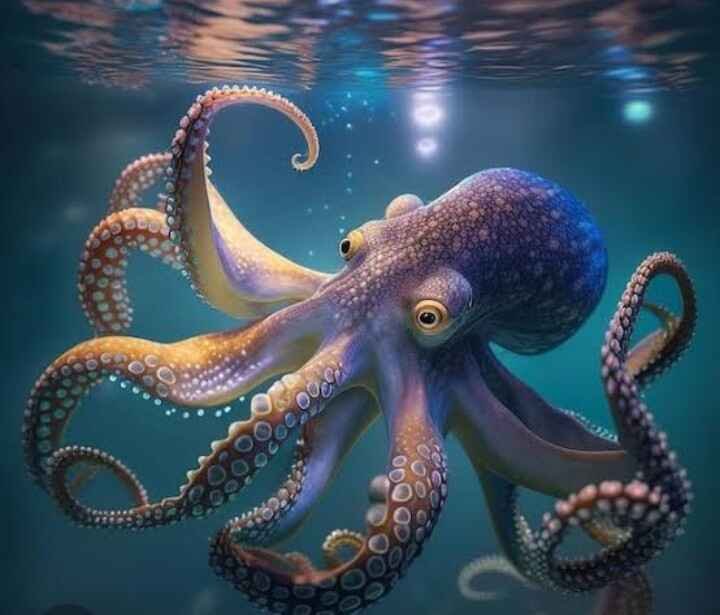How Many Brains Does An Octopus Have? Octopuses have nine brains. Not only do they have a giant brain body mass with their central one, but they also have a tiny brain at the base of each of their eight arms, allowing them to process information and function autonomously in each arm. This uniquely adapted body plan gives octopuses an impressive array of problem-solving talents and adaptability.
One day last week, we shared this video of an octopus using one of its eight unique arms. A primary step to appreciating these captivating beings is understanding their intelligence. Indeed, octopuses are not the only animals with multiple brains. We will guide you through the world of octopus intelligence, bringing not only my experiences but also hearing it from experts and checking research papers like sources, documentaries, and websites scientifically.
You can read: Types of Shark | 25 Best Species of Shark
1. Why an Octopus Is the Most Fascinating Creature in the Sea
The octopus’s brain is spread out between his nine heads. They have a tiny brain for every one of their eight arms; thus, each arm can react to the environment independently, in addition to a central brain. This unusual structure gives octopuses remarkable problem-solving and flexibility capabilities.
The key to appreciating these fascinating creatures is understanding their intelligence. In this article, we have decided to dive deep into the world of octopus intelligence with both a personal and expert point of view, along with several resources like research papers, documentaries, and science websites.
2. The Eight Smaller Brains | How Many Brains Does An Octopus Have?
There are in all places on the arms of an octopus, which means they have a course of knowledge and can help their arm. It allows them to perform complex tasks with a coordinated problem-solving approach. This leads to an interconnected network of brains, which increases the octopi’s intelligence and adaptability, allowing them to excel in different environmental conditions and hunting grounds.
However, from the point of view of octopus anatomy, this is a very interesting part that explains many things like behavior and all their remarkable characteristics.
3. Why Do They Have Smaller Brains in Each Arm?
The small brains in each arm process information so that the octopuses can react independently. This allows them to coordinate complex activities and solve problems. The interconnected network of brains is thought to have allowed octopuses to evolve at an incredibly high level of intelligence and mechanics, which undoubtedly helps them in their natural environment. These unique roots reveal much about the impressive feats of these creatures and how octopuses go about their lives.
4. The Central Brain | How Many Brains Does An Octopus Have?
Octopuses have a central brain that resides in their head, and they use the rest of it to control the body and process information, as in most other creatures. One central brain can process data from the smaller brain in each of its arms, and the Eysenck way of dBq is entirely involuntary and does not denote a thinking system. Higher-order decision-making and sensory processing are also associated with the central brain. The main brain and spotted brains in the arms mean octopuses can solve problems like a few other living things.
5. Distributed Nervous System | How Many Brains Does An Octopus Have?
The octopus is a genuinely remarkable animal with an exceptional capacity for intelligence. One feature that I find truly fascinating about the octopus is its decentralized nervous system, which has a central brain in the head, but each arm has its own tiny brain. oi^{ n }) and can perform highly coordinated tasks and solve complex puzzles with its interlinked network of brains.
On the one hand, the central brain controls most of the body and information functions; on the other hand, their tiny brains are located in their arms, which enables octopuses to think better. Octopuses, for example, have a decentralized nervous system that helps them survive in any number of habitats and with other exceptional behaviors possible.
6. Do Octopuses Have the Capacity to Learn and Adjust?
Octopuses have an awesome distributed nervous system. They have a literature brain in their head and a smaller one for each arm. This configuration also gave them a centralized controller for their behaviors, perception, and decisions.
This network of smaller brains, along with the main brain, gives octopuses their intelligence and problem–solving skills. The decentralized nervous system of octopuses allows them to learn and change according to their surroundings, creating highly intellectual and versatile beings.
7. How Do Octopuses Communicate?
Octopuses can communicate in several ways, including changing color, shape, or texture using body language and ink. Both bigfin and giant Pacific-striped octopuses can produce complex, rocket-powered “handshaking” motions to send signals to other octopuses; they turn their arms into gospels of peace.
The convoluted form of messaging lets octopuses engage with one another and their surroundings, similar to how an evolved human might. Further, they even show their flexibility and ability to communicate with other animals using visual displays and posture. In conclusion, octopuses use diverse, complex communication systems promoting autonomy and intelligence.
8. How Bright is the Octopus Compared to Humans?
The brain of Octopuses are indeed complex and organized in a decentralized way, with one central brain and many distributed, smaller brains situated in each arm. This is a setup that provides them with great intelligence and problem-solving skills. They can even sense the environment and learn, which makes them quite intelligent creatures. In communication, octopuses use several tactics, from changing color, shape and texture, body language, and ink release, and are even capable of arm mimicry.

They also use visual displays and postures when communicating with other species, indicating the many communication methods they can rely on. Regardless of however, the octopus goes about structuring and organizing its brain; it is evident in these other areas they are pretty strong as well: intelligence( whatever the style), means to adapt (creature must make do with existing sensors), two or three-dimensional communications(“hand gestures” considered a 3rd dimension of vocalizations).
9. How is That Different From the Brain of other Animals?
The octopus’s brain is the most unusual in form and function of all those creatures. Where most animals have a centralized brain, the octopus has an intricate and decentralized nervous system- one central brain and separate but interconnected brains within its arms. This combination provides the octopus with high intelligence and problem-solving capability and learning and adjusting to its environment.
Moreover, in communication, octopuses adjust inner coloration (chromatophores), external patterns & shapes, body posture/body language, ink release, and arm gestures to communicate among themselves and other species, making it a flexible communicator. Ultimately, simply because its brain is structured differently does not mean it is less intelligent than other animals, has fewer adaptive capabilities, or can communicate no less.
10. Why Does the Octopus Have Blue Blood?
The blue in the octopus’s blue blood is because it has hemocyanin, a copper-based molecule that makes its blood blue instead of red like our iron (hemoglobin)- based blood. The molecule lets the octopus carry oxygen through its body, putting it to use efficiently even in the chilly, nearly zero-oxygen environments where they often reside.
This adaptation allows the octopus to move perfectly at home in their distinctive environments and has made a big difference in their future survival possibilities.
11. In the Wild, What Would Octopuses be in Danger of?
Octopuses are threatened in the wild by overfishing, pollution, habitat destruction, and climate change. They are also easily caught as bycatch in fishing nets and traps. Furthermore, some octopus species are harvested for the aquarium trade, creating further pressure on their wild populations. Such threats further stress the importance of conservation efforts to protect not only octopus species but also their elaborate habitats.
12. How do We Save Octopus Populations and the Ecosystems on Which they Depend?
Suppose we want to protect octopuses (and the ecosystems they live in). In that case, setting up conservation measures like Marine Protected Areas are crucial tools that allow octopuses and other marine species to grow and thrive without the threat of overfishing and habitat destruction. It is also essential to manage and monitor fishing practices to minimize bycatch and the overharvest of octopus populations.
In addition, efforts to reduce pollution and combat climate change promote healthier octopus homes. Education and learning about the killing process of Octopuses may also help to create more positive responses for conservation efforts. In conclusion, efforts must be made using policy, community engagement, and science to help conserve octopuses and ecosystems.
The Bottom Line
Like us, octopuses are intriguing animals with highly developed brains and peculiar skills. Conservation measures should maintain sustainable fisheries and ecosystems by establishing marine conservation areas, regulating the types of fisheries operations allowed, keeping pollution in check, and combating climate change. However, we need to ensure that octopuses are protected in their ecosystems. We need this information to support all future conservation efforts.
A combination of more stringent policy, community engagement, and rigorous scientific research efforts may be able to do the same in preserving octopus habitats — and the beautiful creatures that come with them.
How Many Brains Does An Octopus Have | A Complex Marvel
| Feature | Description |
|---|---|
| Central Brain | A complex brain located in the head, responsible for overall coordination and intelligence. |
| Ganglia | Smaller brains located in each arm, allowing for independent movement and sensory perception. |
| Neural Network | A vast network of neurons connecting the central brain and ganglia, enabling rapid information processing and complex behaviors. |
| Intelligence | Octopuses are highly intelligent creatures, capable of problem-solving, learning, and memory. |
You can read: Echidna Tiger Shark Attack
Conclusion | How Many Brains Does An Octopus Have?
In a nutshell, we must do something to save octopus populations and their ecosystems. That may be achieved with conservation measures via establishing marine blanketed areas, regulating fishing practices, and lowering pollution and weather exchange impacts.
Increasing training and attention to the function of octopuses in their ecosystems will help ongoing conservation efforts. In partnership with coverage, community engagement, and medical studies, we have an opportunity to protect the health of octopus habitats and steady a future for those tremendous animals.
FAQs
1. How many brains does the octopus have?
Octopus: An octopus has a central brain in its head and another tiny brain that supports each arm. This ability grants the octopus the opportunity to perform a variety of behaviors and solve problems.
2. Why Should Octopus Populations be Saved?
They are crucial to their ecosystems, and the health of marine habitats relies on octopuses. Implementing conservation measures is crucial for maintaining octopus populations and their surrounding environment.
3. This ends in an essential query: what steps can be taken to maintain octopuses?
Conservation efforts, along with setting up marine blanketed areas, regulating fishing practices, cutting down on pollutants, and taking steps to mitigate weather exchange, are key to supporting future wholesome octopus populations and ecosystems.
4. Why is awareness of octopuses vital for conservation efforts?
Most human beings are blind to the importance of octopuses in their ecosystems, so educating and raising consciousness can help with conservation efforts. This can trigger more engagement in communities and policy instruments to protect octopus ecosystems.


[…] Lion | Big Truth in 2024 Black Snake With White Stripes | A Comprehensive Guide With 7 Steps How Many Brains Does An Octopus Have | A Comprehensive Guide With 12 Steps Malayan Tiger Species | A Comprehensive Detail With 10 Steps Types of Shark | 25 Best […]
[…] You Can Read: How Many Brains Does An Octopus Have […]